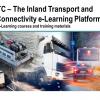News
Displaying Results 26 - 50 of 131
The UN Secretary-General's Special Envoy for Road Safety, Mr. Jean Todt, is in Athens on 26 and 27 September to meet several high-level officials in Greece such as the Minister for Foreign Affairs, the Minister of Citizen Protection, the Minister of Infrastructure & Transports, the Minister of…
Public procurement represents 10 per cent of Georgia’s GDP. Therefore, innovation-enhancing procurement (IEP) can be a powerful policy lever to catalyze innovation and promote sustainability. Using public procurement to drive innovation is one of the recommendations arising from the Innovation for…
Are you interested in learning how to promote policies to strive towards sustainable transport and better trade connectivity? Do you want to learn about the UN inland transport and trade facilitation legal instruments and standards? Do you want to increase your capacity, knowledge base and skills…
The Covid-19 pandemic continues to hit hard the countries of the United Nations Special Programme for the Economies of Central Asia (SPECA) and highlights the need to diversify from current, resource-dependent models of economic development. This will mean putting ‘innovation and technology that…
UNECE and partners train 17 Sub-Saharan African Countries on the TIR/ eTIR and CMR /eCMR Conventions
UNECE teamed up with the Islamic Center for the Development of Trade (ICDT) and the Islamic Development Bank (IsDB) to organize a training workshop on International Road and Goods Transport Conventions for executives of the Ministries of Trade and Customs Administrations of 17 member countries of…
At what point do we cease to be alarmed by a shocking reality? Many of you may already be familiar with the following figures, from the last WHO Global Status Report on Road Safety (2018).
Every year 1.3 million people are killed and around 50 million injured on the world’s roads, often with…
Countries of the Eastern Europe and the South Caucasus (EESC) sub-region (Armenia, Azerbaijan, Georgia, the Republic of Moldova, and Ukraine) have a lot of potential to continue the transition to a more sustainable economic growth model that is less vulnerable to external shocks. Innovation, or…
The temporary importation of private and commercial vehicles is managed through “carnet de passages en douane” (CPD) on the basis of two international conventions (the 1954 Customs Convention on the Temporary Importation of Private Road Vehicles; and the 1956 Customs Convention on the Temporary…
Countries in the UN Special Programme for the Economies of Central Asia (SPECA) are falling behind potential on many metrics of innovation performance. R&D spending remains below 1 per cent of GDP, almost entirely publicly funded, and SPECA countries rely extensively on natural resources,…
Building upon the recent Innovation for Sustainable Development Review (I4SDR), UNECE and the Ministry of Innovative Development of Uzbekistan are discussing the implementation of the report recommendations and engaging in dialogue on sustainable innovation-led development this week in Geneva at…
As countries work towards the Sustainable Development Goals (SDGs), the importance of innovation as a leading driver is growing. Systematically trying out new ideas to create value, govern, and organize society to the benefit of all is essential to find out what works and what does not. These ideas…
Uzbekistan faces serious challenges in the realm of road safety, with around 3,600 people killed on its roads in 2018, according to WHO figures. Between January and March 2022 alone, 39 children lost their lives on the country’s roads, where 204 out of 1,469 road accidents involved children,…
A small sub-set of small- and medium-sized enterprises – innovative, high-growth enterprises (IHGEs) – plays an outsize role in innovation and structural transformation as they spearhead experimentation with new ideas to create value, address challenges, and reduce transaction costs. A critical…
UNECE is deepening cooperation in Eastern Europe and the South Caucasus (EESC) (Armenia, Azerbaijan, Belarus, Georgia, the Republic of Moldova, and Ukraine) to support innovation-led, sustainable growth in line with the United Nations Agenda 2030. Effective innovation policy, which facilitates the…
Since its independence, Armenia has been one of the fastest-growing economies among the countries in Eastern Europe and South Caucasus (EESC) with GDP growth averaging 6 percent during the last two decades. Fueled by substantial reforms and increased foreign investment, the country embarked on a…
COP26 was a positive step forward in the fight against climate change, but as the UN Secretary General pointed out in his comments: “it is not enough. We must accelerate climate action to keep alive the goal of limiting the global temperature rise to 1.5 degrees.” The compromise deal reflects the…
Transitioning towards a knowledge-based economy away from a resource-intensive model of economic growth is central for sustainable development among the seven countries of the UN Special Programme for the Economies of Central Asia (SPECA) - Afghanistan, Azerbaijan, Kazakhstan, Kyrgyzstan,…
As world leaders gather in Glasgow for COP 26, there is increasing recognition that the transition to renewable energy is vital to tackle climate change. The circular economy aims at sustainable production, consumption and resource use by minimizing pollution, turning waste products into productive…
Since their independence, countries in Eastern Europe and the South Caucasus (EESC) – Armenia, Azerbaijan, Belarus, Georgia, the Republic of Moldova and Ukraine – have introduced far-reaching reforms to boost innovation and benefit from the potential of the growing knowledge-based economy.…
UNECE is deepening its support to help countries of the region capitalize on innovation to recover from the pandemic and realize the ambitious vision of the 2030 Agenda.
The UNECE Innovation for Sustainable Development Review (I4SDR) of Uzbekistan, which is currently underway, will set out…
Countries of Central Asia, the Caucasus and Eastern Europe have been hit hard by the socioeconomic impacts of the COVID-19 pandemic, which threatens to derail sustainable development progress in the region.
However, there is also a stronger momentum towards regional cooperation, and countries can…
Migration is an old and growing phenomenon – the United Nations Populations Division estimates that around 266 million people live outside their country of origin. In the UNECE region, by 2019 there were around 45 million people from Eastern Europe and Central Asia living abroad, with more than…
Both innovation and Public-Private Partnerships (PPPs) are essential drivers of economic development, environmental sustainability and social inclusiveness.
The UNECE region was hit hard by the COVID-19 crisis, not only because of the health crisis itself but also, even as the threat recedes…
Innovation has huge potential to drive sustainable development if supported by a vibrant innovation ecosystem. This requires effective linkages and collaboration at national level, and an innovation culture nurtured by a system of support to start ups and institutions such as business incubators.…
Mobility is a primary enabler of our economic and social life. However, despite its many benefits, the costs of mobility to societies around the world remain unacceptably high. These include greenhouse gas emissions (transport accounts for some 24% of global CO2 emissions, three quarters of which…


























